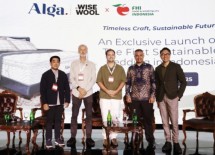Clean Earth Technologies’ New Class Of Polymers Invented By Associate Professor, Justin Chalker, Receives Australian Pm’s New Innovator Award
By : Krishna Anindyo | Friday, October 30 2020 - 10:30 IWST

Clean Earth Technologies (CET)
INDUSTRY.co.id - Singapore – Clean Earth Technologies (“CET”), which collaborates extensively with the renowned Chalker Lab from Flinders University in Australia, today announced that Associate Professor Justin Chalker is one of the recipients of the Australian Prime Minister’s prestigious “New Innovator Award” for the year 2020, under the Australian Awards for Science.
Associate Professor Justin Chalker has invented a novel class of polymers synthesised directly from elemental sulphur which is a waste by-product of the petrochemical industry and renewable plant oils.
This new class of polymers is now patented and assigned to CET and has the capability to provide sustainable solutions to long-term global environmental challenges by replacing toxic practices. CET’s collaboration with Associate Professor Chalker on this development is the first of many more exciting developments to come.
“We congratulate Associate Professor Chalker for receiving the prestigious New Innovator Award from the Prime Minister of Australia. He is being recognised for his invention which can provide sustainable solutions to some of humanity’s greatest challenges, namely, ensuring clean air, fresh water and sustainable food production. The sulphur-based polymer has the potential to be a game-changer in solving environmental problems”, said Mr Kevin Fell, Group CEO of Clean Earth Technologies.
The vast majority of polymers (such as conventional plastic and rubber) are made from unrenewable building blocks and many of these materials are non-recyclable. Associate Professor Chalker’s ground-breaking research translates these laboratory discoveries into global technologies that help protect the environment and benefit mankind.
“Sulphur which is a by-product of the petroleum industry, is produced in millions of tonnes every year. There are literally mountains of it lying around the planet. We convert that waste sulphur into new polymers that have never existed before, to use in innovative applications. This includes capturing heavy metal pollution (for example, mercury), oil spill clean-up, slow-releasing fertiliser and the recovery of valuable metals such as gold. We are proud to be working with CET to translate these laboratory discoveries into global technologies that help protect the environment. CET has invested heavily in South Australia to get a plant up and running to produce this material,” said Associate Professor Chalker from the Flinders University.
“We are pleased to announce that we are now at a stage where we are looking to collaborate with various industry groups to refine these solutions in the field”, added Mr Kevin Fell.
These sulphur-based polymers are genuinely providing non- toxic alternatives in addressing these environmental concerns:
Oil Spill Clean-Up
This novel polymer has a high affinity for crude oil and diesel fuel. It can be used in cleaning up oil spills in the ocean and water-ways. When the polymer is applied to an oil spill, it gathers the oil into a gel upon contact for easier retrieval. This is a breakthrough in cleaning up oil spills when incidents happen in the ocean or water-ways.
Mercury and Cyanide-Free Gold Mining
Artisanal and small-scale gold mining is the largest source of mercury pollution on Earth. Nearly 20 million subsistence miners are using mercury to extract gold from ore in formal and large- scale gold mining. It is also common to use highly toxic cyanide to leach gold.
Associate Professor Chalker has recently patented a gold mining process that eliminates the use of toxic mercury and cyanide. The process features a novel and safe way to rapidly leach the gold in high yield.
The sulphur polymer is then used to recover the gold. This process is being developed commercially for both gold mining and e-waste recycling. CET is ready to offer this solution to get rid of mercury and cyanide in artisanal and small-scale gold mining operations.
Mercury Remediation
Environmental contamination caused by mercury is a serious global issue. Associate Professor Chalker’s polymers are excellent agents for mercury capture. They work to remove contamination from the air, water and soil at a rate and volume competitive with current commercial sorbents.
Slow Release Fertilisers
Associate Professor Chalker has also shown that fertiliser nutrients can be embedded in his sulphur-based polymer. This allows the slow release of nutrients, with the polymer acting as a source of the micronutrient sulphur. Since more than 50 percent of all fertilisers applied globally is lost to run-off, this not only makes them inefficient, but it can also directly impact the ocean and waterways.
The fertiliser formulation by Associate Professor Chalker is a breakthrough for crop production. This solution will be a boon to the agricultural sector.
Read Also
President Jokowi Inaugurates Kali Dendeng Water Supply System
Black & Veatch Set Investment of a US$500M for Build Plants Green…
Indonesian Chamber of Commerce and Industry taps AC Ventures’ ESG…
Powering the Circular Economy: Green Li-ion Creates World’s First…
Ministry of Energy and Mineral Resources Introduces Hydrocarbon Technology…
Today's Industry

Sabtu, 26 Juli 2025 - 08:54 WIB
ALGA Launches Indonesia's First Eco-Friendly Bedding in Collaboration with Wisewool New Zealand
ALGA Launches Indonesia's First Eco-Friendly Bedding in Collaboration with Wisewool New Zealand

Rabu, 09 Juli 2025 - 08:55 WIB
Indonesia's First Harman Professional Experience Center Opens in Jakarta
PT Inti Megah Swara (IMS Indonesia) announces the grand opening of the country's first Harman Professional Experience Center, located at Desound Melawai, South Jakarta.

Senin, 09 Juni 2025 - 14:22 WIB
Savyavasa and Permata Bank Launch Exclusive Foreign Mortgage Program
Savyavasa, a luxury residential development by Swire Properties and JSI Group under PT Jantra Swarna Dipta, in collaboration with Permata Bank, presents a new solution for foreign nationals…

Rabu, 21 Mei 2025 - 10:09 WIB
Indonesia, Thailand Sign MoU on Health Sector, Focusing on Global Capacity, Collaboration
As a part of President Prabowo Subianto’s official visit to Thailand, both countries signed a Memorandum of Understanding (MoU) on health sector, in an effort to strengthen bilateral cooperation…

Rabu, 21 Mei 2025 - 10:06 WIB
Indonesia, Thailand Deepen Cooperation on Security, Trade, and Regional Stability
resident Prabowo Subianto has reaffirmed Indonesia’s strong commitment to deepening bilateral relations with Thailand during the meeting with Thailand’s Prime Minister Paetongtarn Shinawatra…

















News Comment